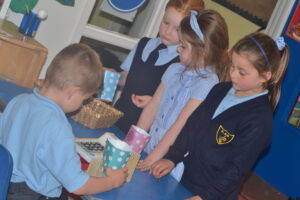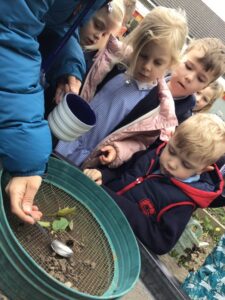
At St Mary Magdalen’s, we passionately believe that children build strong foundations for learning through play and exploration. We provide opportunities for the children to learn from real-life experiences, in a context they can relate to, building on needs and next steps as we go. By using our open-ended resources in the indoor and outdoor environments, we aim to foster a love of learning for all of our children and consolidate learning at every opportunity. Our continuous provision is regularly adapted and enhanced to promote any interests the children initiate and foster a deeper understanding of the knowledge and skills they acquire. The use of Forest School is developing and our spiritual garden is used for times of quiet reflection. We strongly believe that EYFS is a vital stage in the development of the whole child and therefore ensure we give every child the best start we possibly can.

The EYFS Framework explains how and what children in our EYFS will be learning to support their development. At the end of Reception, each child will be assessed against 17 key areas called the Early Learning Goals (ELG’s). This is known as the Early Years Foundation Stage (EYFS) Profile. For each early learning goal, practitioners must judge whether a child is meeting the level of development expected at the end of the Reception year (‘expected’) or not yet reaching this level (‘working towards’).
The completed EYFS Profile also includes a short commentary on each child’s skills and abilities in relation to the three key characteristics of effective learning. This will support future curriculum planning and will provide the Year 1 teacher with important information about each child’s approach to learning.
Assessments
There are assessments when a child is aged between 2 and 3 years and at the end of the academic year when they turn 5. These are not tests for the child – the assessments are based on EYFS practitioners’ observations.
Information from these assessments is used for parents, practitioners and teachers to support children’s learning and development.
Early years learning concentrates on 7 areas split between prime and specific areas of learning, however they are not be used as checklists as each child develops at their own rate and in their own way, similarly children do not need to have achieved every part of each ELG to be deemed as at the expected level of development. Teaching is often done through play, where the child learns about subjects and other people through games.
Prime Areas
Children in the EYFS should mostly develop the three prime areas first. These are:
- Communication and language;
- Physical development;
- Personal, social and emotional development.
These prime areas are those most essential for children’s healthy development and future learning. As children grow, the prime areas will help them to develop skills in four specific areas.
Specific Areas
- Literacy;
- Mathematics;
- Understanding the World;
- Expressive arts and design.
These seven areas are used to plan our EYFS children’s learning and activities. Our EYFS staff members teach and support the EYFS children, making sure that the activities taking place in the EYFS unit are suited to each child’s unique needs. This is a little bit like the curriculum in the rest of the school, but it is particularly aimed at and suitable for very young children; and it is designed to be really flexible so that the EYFS staff members can follow the children’s needs and interests.
Planning

